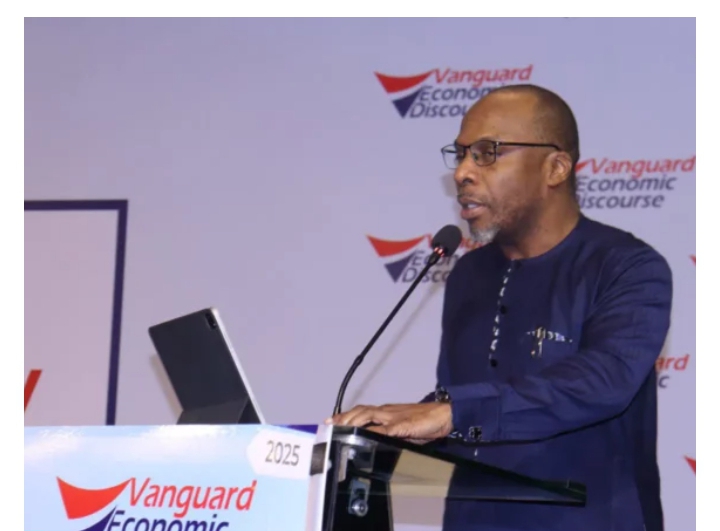The Group Chief Economist and Managing Director of Research and Trade Intelligence at Afreximbank, Dr Yemi Kale, has raised alarm over Nigeria’s escalating youth unemployment rate, describing it as a ticking time bomb with serious national security implications. Speaking at the 2025 Vanguard Economic Discourse held in Lagos on Wednesday, Dr Kale stressed that Nigeria’s inability to absorb millions of young entrants into the labour market each year could morph into a full-blown crisis if not urgently addressed.
The discourse, themed ‘Nigeria’s Economic Outlook 2025: Hardship and Pathways to Sustainable Recovery’, brought together top economic minds, policymakers, and private sector leaders to discuss the country’s current economic trajectory and practical steps towards recovery.
Although the National Bureau of Statistics recently reported a drop in youth unemployment for ages 15 to 24—down from 8.4% in Q1 2024 to 6.5% in Q2—Dr Kale pointed out that the broader picture remains troubling. Citing a combined unemployment and underemployment rate of over 53%, he argued that the apparent gains are insufficient when millions of Nigerian youths remain idle or underutilised.
“We must take unemployment seriously,” Kale stated. “Every year, four to five million young Nigerians enter a labour market that simply isn’t creating jobs at the required scale. When we ignore this, we aren’t just neglecting an economic issue—we are courting a national security threat.”
He advocated targeted interventions to reverse the trend, urging the government and private sector to invest in vocational and digital training aligned with high-growth sectors. He also called for increased access to credit for micro, small, and medium-sized enterprises, scaling of infrastructure projects linked to job creation in agribusiness, logistics, and renewable energy, as well as incentivising private sector employment through tax breaks and wage subsidies.
Dr Kale further highlighted the country’s deepening food insecurity, which affects over 25 million Nigerians. According to him, insecurity in agricultural belts, climate shocks, floods, and poor infrastructure continue to hinder productivity and market access. He called for urgent interventions such as rural road development, irrigation expansion, cold storage infrastructure, improved inputs, and better security in farming communities. “This is not just about food,” he said. “It’s about dignity, survival, and national stability.”
Turning to Nigeria’s fiscal health, Kale noted that while the country’s debt-to-GDP ratio stands at a moderate 34.2%, its debt service-to-revenue ratio has ballooned past 40%, posing serious concerns about long-term sustainability. He praised the removal of fuel subsidies but warned that the financial savings must be redirected into productive sectors or risk eroding public trust.
He recommended widening the tax net through digital compliance mechanisms, prioritising concessional borrowing and debt-for-development swaps, improving public finance transparency, and ensuring better coordination between federal and subnational governments.
“In facing these challenges, the real issue isn’t a lack of ideas,” Kale concluded. “We have the solutions, backed by data and global examples. What Nigeria lacks is execution—decisive, consistent, and accountable implementation led by a government that listens to its people and understands their realities.”
The President of the Nigerian Association of Chambers of Commerce, Industry, Mines and Agriculture (NACCIMA), Dele Oye, who chaired the event, echoed similar sentiments, urging Nigeria to deepen intra-African trade and maximise the potential of its free trade zones. He noted that protectionist moves in Western economies should be a wake-up call for African nations to build resilience through regional integration and value addition.
Oye stressed the importance of prioritising export processing over raw material exportation, arguing that this would not only boost foreign exchange but also enhance local capacity, job creation, and technology transfer. Using China and Dubai as case studies, he underscored the significance of free trade zones in catalysing national development and warned against policies that would stifle investment in such zones.
“Out of the 50 free trade zones in Nigeria, government controls only a small portion. Taxing these private-sector-led zones would be akin to penalising innovation and undermining Nigeria’s global competitiveness,” Oye said.
The Chief Executive Officer of the Nigeria Economic Summit Group (NESG), Dr Tayo Aduloju, also added his voice, calling for a new model of public-private collaboration in Nigeria’s development journey. Citing examples from emerging economies like Brazil, Indonesia, and Malaysia, Aduloju emphasized that successful economic transformation requires clear responsibilities, mutual accountability, and shared commitment between government and the private sector.
“Transformation is a two-way street,” he noted. “If we choose to reform, each sector must know its role—what government must do, and what business must do—and we must hold each other accountable. That is the only way forward.”
The forum ended with a consensus that while Nigeria faces daunting challenges—from unemployment and food insecurity to debt pressures—there remains a clear path to recovery if reforms are matched with bold, transparent, and sustained execution.

